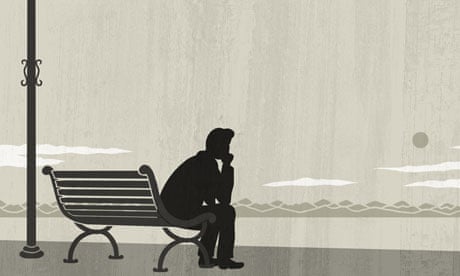'Anything, anything would be better than this agony of mind, this creeping pain that gnaws and fumbles and caresses one and never hurts quite enough!" wails the character of Garcin in Jean-Paul Sartre's play No Exit, brilliantly encapsulating both a) the human condition, and b) the experience of banking with Santander, though it's possible that last one's a coincidence. Garcin is having an existential crisis, as people tend to do in Sartre. (These days, he could just pick up a copy of The Purpose-Driven Life and be done with it.) He's facing the Big Question: how to deal with life's apparent meaninglessness? Of course, many other philosophers, not to mention self-help gurus, would argue that life isn't meaningless – that meaning's to be found in family, or work, or spirituality. But intriguing new research suggests that, for a sizeable chunk of the population, a different answer to the Big Question may be more pertinent: who cares?
Psychologists have tended to assume people can be located on a simple continuum: at one end, those who feel their lives are deeply meaningful, and are consequently happy; at the other, those who feel their lives lack meaning, and feel tortured or depressed. (Something like this is implicit in Abraham Maslow's venerable "pyramid of needs", with self-actualisation at the summit.) But a study by Tatjana Schnell, of the University of Innsbruck in Austria, based on a survey of 603 Germans, found 35% of them were "existentially indifferent": they didn't feel their lives had meaning, and frankly, it didn't much bother them.
Judging by Schnell's efforts to measure their levels of life-satisfaction, these chilled-out types aren't as happy as those who score high on the meaningfulness scale, but they're significantly happier than those who crave meaning yet lack it. "Without commitment to sources of meaning, life remains superficial," Schnell observes. "But superficiality is not necessarily a state of suffering." She doesn't seem to think much of existential indifference – "[it] can hardly be viewed," she argues, "as living a life of health and wellbeing." Still, it's not Sartre-style hell, either. If you do want to live a life of meaning, her other results suggest, it's better to be married, and slightly better to be employed, among other factors. But it's entirely possible – not that you'd ever imagine it from the legions of self-help books promising to help you "discover your purpose", "find your calling" or "live a life that counts" – that you simply don't care.
Well, not you specifically. I suspect reading magazine columns about the psychology of happiness isn't high on the agenda of the existentially indifferent: to them, pretty much by definition, Schnell's findings presumably don't matter. But for the rest of us – the non-indifferent – they carry some powerful and ultimately reassuring implications. Compulsively, we compare ourselves with those around us and find our lives wanting: other people seem to have found meaning, while we're still searching. Partly, that's because we have no direct access to their inner torment. But it also may be because they're not looking for meaning in the first place. Perhaps that's a blessing of sorts, but it's hardly the enviable state of fulfilment we imagine must suffuse their lives. Being the kind of person who seeks answers in life is troublesome enough. There's no point feeling inferior to those who aren't even asking the questions.

Comments (…)
Sign in or create your Guardian account to join the discussion